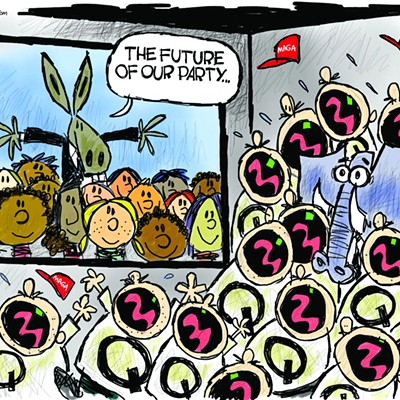Voters in LD 26, which stretches from SaddleBrooke down through Oro Valley and across the Catalina foothills, picked rookie Democrat Charlene Pesquiera--who was so new to politics that she had never even voted before 2006--over Republican Al Melvin, who had knocked out moderate Republican Toni Hellon in the GOP primary.
This year, history has repeated itself, at least so far. Earlier this month, Melvin was able to once again knock out a moderate Republican, Pete Hershberger, in the GOP primary, capturing 53 percent of the vote. Melvin's strategy this year was identical to that of his 2006 campaign: Paint his opponent as too liberal for Republican primary voters.
The potential problem: Melvin could end up being perceived by general-election voters as too conservative for moderate Republicans, Democrats and independent voters. That's surely what led to his narrow loss in 2006, when he was swept up in the blue wave that washed across most of the country and delivered control of Congress to the Democrats.
This year, Melvin won't be facing Pesquiera, who has decided that one term at the Legislature is enough. Instead, he'll be challenged by Cheryl Cage, a one-time flight attendant who turned her experience into a consulting business aiding pilots in the aviation industry.
Cage says she's been interested in politics for as long as she can remember, although most of her experience came from volunteering for campaigns. She moved to Arizona from Denver in 1999 and ended up working on John Kerry's 2004 presidential campaign alongside Democrat Lena Saradnik.
Cage and Saradnik ended up taking a political-training course aimed at Democratic women. When Saradnik decided to make an underdog run for a House seat in Legislative District 26 in 2006, Cage signed on as her campaign manager. With some late help from the Arizona Democratic Party, which hired ace field manager Katie Bolger (who is now working as an aide to Tucson City Councilman Rodney Glassman), Saradnik defeated Republican Dave Jorgenson by more than 5,200 votes on Election Day. (Saradnik would later suffer a stroke and resign from office, which led to the appointment of Democrat Nancy Young Wright, who is now running for one of the LD26 House seats.)
The experience of managing Saradnik's campaign has given Cage experience in courting LD26 voters.
"We presented to the voters a more centralized person--someone who was willing to be inclusive instead of someone who was more of an ideologue," says Cage. "And I think that resonated."
Cage is hoping a similar dynamic will be at work this year in the Senate race as she presents herself as a moderate Democrat in a district that's home to roughly 46,100 Republicans, 37,300 Democrats and 29,000 independents.
Melvin is about as conservative as they come--and proud of it. He spent three decades in the Naval Reserve before retiring as a captain. He had a parallel career in the Merchant Marines that allowed him to travel the globe.
He moved to SaddleBrooke about six years ago and has built a powerful political machine in the retirement community; in the GOP primary earlier this month, he crushed Hershberger in Pinal County by a nearly 3-to-1 margin.
Melvin has five main planks in his campaign platform: He wants to secure the border, including having local police ask about citizenship status when they pull someone over for a traffic infraction; cut taxes, even in the face of Arizona's budget shortfall; encourage private operators to build a desalinization plant that could turn seawater from the Pacific Ocean and the Gulf of California into drinking water; push for more competition among private and public schools; and encourage a private operator to build a second nuclear power plant in Arizona.
Cage doesn't agree with Melvin on many issues. She's pro-choice; he's pro-life. She would push for solar incentives rather than hoping that a private operator would build and run a nuclear power plant. He supports amending the state Constitution to ban gay marriage; Cage opposes the proposition on the November ballot.
Cage says too much of the Legislature's time is spent on "wedge" issues like gay marriage and allowing guns on school campuses.
"I want to focus on issues that matter to people on a daily basis," says Cage, adding that the state needs more focus on education, regional planning and developing the state's economic base beyond construction and tourism.
One big difference between the candidates involves the debate over repealing the state's property tax, which raised about $250 million a year until lawmakers temporarily suspended it during better economic times a few years ago. The tax, which costs the average homeowner in Pima County less than $100 a year, is set to come back next year.
Melvin says he'd vote to get rid of the tax forever.
"I believe that (John F.) Kennedy and (Ronald) Reagan and the current president have proven that lower taxes generate more economic activity," Melvin says. "As we lower taxes, we need to cut wasteful spending. There's a lot of waste out there."
Melvin doesn't identify much of that waste, other than to say that state departments shouldn't have employees who lobby lawmakers. Instead, he says that supervisors should be given the chance to decide how to trim their budgets by 10 to 15 percent across the board.
"Leave it to the department heads to figure out how to work it out," he says.
Cage says it doesn't make sense to get rid of the tax when the state is facing a dire budget meltdown, although she agrees that state government departments need to be cut in the short term while the economy bounces back.
Although he says that government spending is out of control, Melvin owes much of his own political success to a government program: Clean Elections.
Since 2006, Melvin has received more than $100,000 for his political campaigns, while every candidate he's beaten has raised campaign dollars through the private sector. (However, in the upcoming general election, Cage is also using Clean Elections dollars.)
Melvin is one of several social conservatives in the Republican Party who have successfully used Clean Elections to knock out GOP moderates in primaries. He's well aware of the irony that a government program put into place by liberals has had the unintended consequence of helping conservatives increase their influence at the state Capitol.
"This Clean Elections setup was put into place by liberal Democrats with the goal of getting liberal Democrats elected, and just the opposite has happened," Melvin says. "More conservative Republicans have been elected as a result of it."
Melvin sees no contradiction between arguing that government should do less and taking government money for the benefit of his own campaign.
"As long as it's a provision of the state, I think any candidate should have a right to use it," he says.















